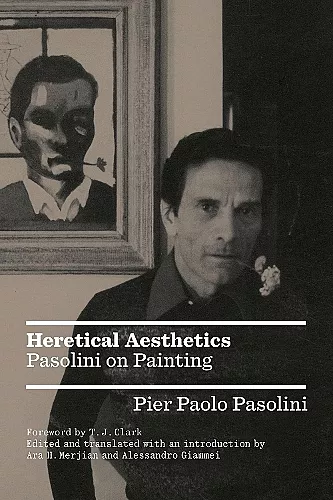Heretical Aesthetics
Pasolini on Painting
Pier Paolo Pasolini author T J Clark author Ara H Merjian editor Alessandro Giammei editor
Format:Paperback
Publisher:Verso Books
Published:1st Aug '23
Should be back in stock very soon

First collection on filmmaker and poet Pasolini's passion for painting
One of Europe's most mythologized Marxist intellectuals of the 20th century, Pier Paolo Pasolini was not only a poet, filmmaker, novelist, and political martyr. He was also a keen critic of painting. An intermittently practicing artist in his own right, Pasolini studied under the distinguished art historian Roberto Longhi, whose lessons marked a life-long affinity for figurative painting and its centrality to a particular cinematic sensibility.
Pasolini set out wilfully to "contaminate" art criticism with semiotics, dialectology, and film theory, penning catalogue essays and exhibition reviews alongside poems, autobiographical meditations, and public lectures on painting. His fiercely idiosyncratic blend of Communism and classicism, localism and civic universalism, iconophilia and aesthetic "heresy," animated and antagonized Cold War culture like few European contemporaries. This book offers numerous texts previously available only in Italian, each accompanied by an editorial note elucidating its place in the tumultuous context of post-war Italian culture.
Prefaced by the renowned art historian T.J. Clark, a historical essay on Pasolini's radical aesthetics anchors the anthology. One hundred years after his birth, Heretical Aesthetics sheds light on one of the most consequential aspects of Pasolini's intellectual life, further illuminating a vast cinematic and poetic corpus along the way.
Vision in Pasolini is at once tactile, earthy, erotic, divine and communist. His way of seeing communes with the world rather than holding it at a distance. By bringing together his writings on art, Heretical Aesthetics gives the Anglophone reader the key to his at once singular and generous cinema and poetry. His is a perspective from elsewhere in history, one which holds our own times sternly to account. This is such a good book for understanding one of the very best of 'bad' Marxists. -- McKenzie Wark
Magisterially translated and edited, this indispensable anthology is finally available to an English-speaking audience. It provides detailed and precise insight into Pasolini's convulsive and idiosyncratic relationship with the visual arts and the artists who inspired his aesthetic sense. This exhilarating trove sheds light on the contaminated and visionary visual landscape produced by one of the most important filmmakers in the history of cinema: a total artist who found expressive depth in the heretical forms of his vision. -- Pierpaolo Antonello
Pasolini's intimate relation to painting and the history of art demonstrated in these essays is a revelation, especially for understanding his films. The texts are classic Pasolini - unfailingly brilliant and erudite, but also at once revolutionary and reactionary, observant of his times and blind to some of the most innovative developments. A fascinating collection. -- Michael Hardt, author of The Subversive Seventies
Extensively analyzed, Pasolini's cinematographic oeuvre constitutes a model of thinking the world, informed by a distinctive creative vision and his multiple interests and passions. In this unique publication, Ara H. Merjian and Alessandro Giammei provide a missing link in Pasolini's intellectual process: his deep interest in art history, and particularly painting. It is a fascinating read: Pasolini on Caravaggio, Pasolini on Warhol, Pasolini on Picasso, Pasolini on Fabio Mauri. These accomplished short essays cast a new light on his films, adding another significant layer to the work of one of the twentieth century's most prominent and fearless intellectuals. -- Alfredo Jaar
Pier Paolo Pasolini was a visionary and anti-conformist polymath: a poet, painter, essayist, social critic, film-maker, novelist, traveller, and philosopher. This anthology is the very first of its kind and fills a huge lacuna in Pasoini's studies. A crucial source for anyone interested in Italian debates over aesthetics and the cultural history of the fifties, sixties, and seventies, and a magnifying glass of post-war Europe during the Cold War. -- Angela Dalle Vacche
ISBN: 9781804291283
Dimensions: 210mm x 140mm x 16mm
Weight: 300g
224 pages